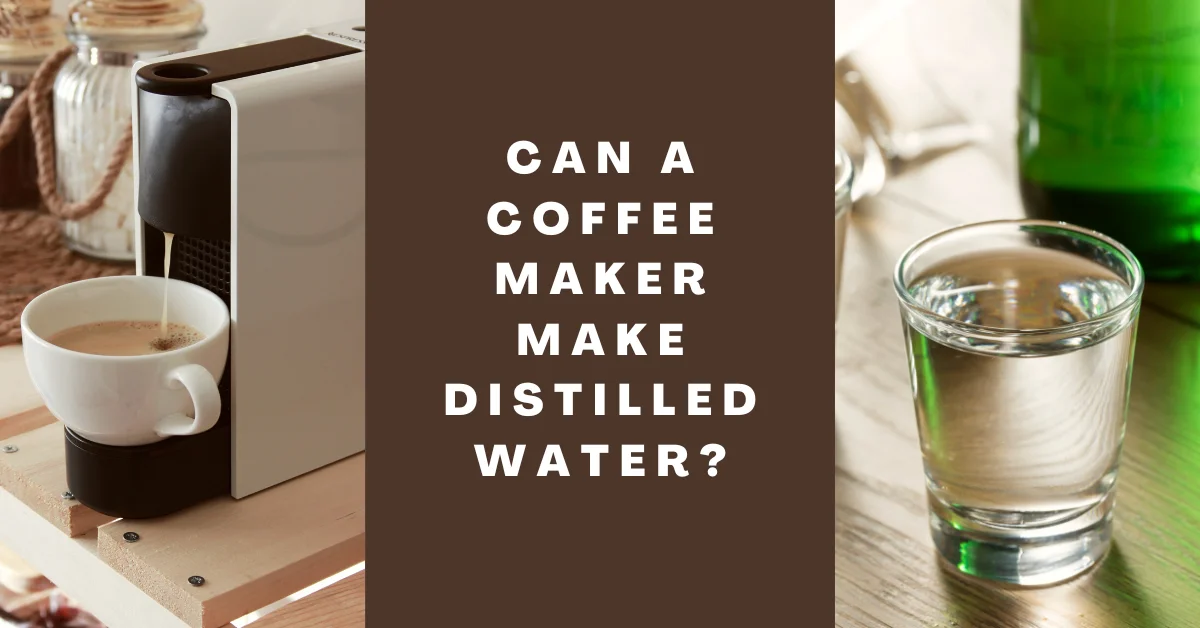Distilled water is considered one of the healthiest options when it comes to drinking water, mainly because of the promise that all impurities are extracted from it. And by all, I mean any bacteria, pathogens, minerals, etc. What if you one day decide to make distilled water at home but don’t have the fancy equipment required to produce it? Can you use that coffee maker lying in your kitchen to make distilled water?
Can a coffee maker make distilled water?
No, a coffee maker can only boil water. It’s not equipped to carry out the condensation part of the entire distillation process. It doesn’t have a cold surface where the steam could condense into distilled water. Therefore, a coffee maker can’t be used to make distilled water.
Do you want to hop on the “healthy lifestyle” trend? You might want to start by switching to distilled water. Why? Simply because it is the safest and healthiest drinking water option out there because distilled water is devoid of all contaminants. Alongside impurities, even organic materials such as salts and minerals are removed from the water. So how do you make it at home and avoid bottled distilled water?
How to make distilled water at home?
Though it is not recommended, you can try using your coffee pot instead of the coffee maker to produce distilled water. You’d need a large pot of water, a fire brick, plenty of ice cubes, and of course, a coffee pot along its lid.
The process is rather tedious and unorthodox, but when you have to make the best of whatever you’ve got, this is the way to go. Please be patient with the procedure, as rushing it will most probably ruin the quality of results.

STEP 1: Warm the water
Firstly, you would need to fill up a large enough pot of water and place it on your stove. Carefully put the fire brick inside this pot of water and place your coffee pot on top of it. Make sure to balance these items properly to avoid spillage.
STEP 2: Boil the water
For this step, you would need to make use of the rounded pot lid of the coffee pot. Situate the lid cautiously on top of the pot of water, directly above the coffee pot. You need to start boiling the water at this point, so turn your stove’s heat up. Water usually needs temperatures ranging from 212-215°F to boil properly. Once the water starts to boil, you must lower the heat and continue to let it boil steadily.
STEP 3: Add ice cubes
Immediately after the second step, as your water begins to boil, pour in at least three trays of ice cubes or more on the top of your coffee pot’s rounded lid. The number of ice cubes depends on your preference, as that’s the amount of distilled water you would be getting in the end. If the size of your ice cubes is small, it’s preferred to add more than three trays.
STEP 4: Collect the vapors
Once the steam starts to rise, the cold lid of the coffee pot will help condense it, which is the most important part of the distillation process. Make sure your lid is disinfected and clean. The steam that condenses into water will start dripping into your coffee pot as it is placed proximately below it. Again, make sure that your coffee pot is also cleaned and disinfected to avoid contaminating the distilled water.
STEP 5: Enjoy distilled water at home
The water collected in the coffee pot will be distilled water. Wait for the water to cool down before you store it in any bottles, and ensure you are using BPA-free plastic bottles. The taste of distilled water may not be recognizable as it would have lost elements like phosphorous, iron, etc. Enjoy your healthy drinking water!
The key to this entire method lies in your patience, as it approximately takes 30-40 minutes or more to make one-quarter of a gallon of distilled water. But if you can end up with homemade distilled water, I think it’s worth your time.
If you’re wondering how to use a drip coffee maker, read this article right now: how to use a drip coffee maker?
What is the difference between purified and distilled water?
Purified water has been filtered efficiently to remove impurities; however, unlike distilled water, essential minerals such as magnesium, calcium, etc. are not removed in the process. So, it all depends on your personal preference as both are equally good, healthier options.
In essence, both distilled and purified water are safer options than tap water as they’re free from contaminants. If the area you live in doesn’t have access to clean tap water, you should invest time and energy into either distilling water or obtaining purified water.
Here is an interesting article on how to use a coffee maker with milk!
What are the pros and cons of drinking distilled water?
Generally, it is believed that distilled water, when adopted into your daily routine, benefits the body in various ways, including reducing the risk of disease, detoxifying, and improving overall bodily function. However, the distillation process does take out important minerals which are essential to your body.
Now, let us look at some of the pros and cons of switching to distilled water!
The pros of drinking distilled water
Let’s discuss the pros of drinking distilled water.
1. A simple and natural process
Distillation is a very natural process to purify water as it doesn’t require you to use filtering devices or add any questionable chemicals to it. It’s a simple process that you can carry out at home, thus making it an accessible and naturally derived option.
2. Detoxification of the body
Distilled water can help cleanse the body from harmful and harsh chemicals and thus detoxify it.
3. Reduces exposure to diseases
Drinking distilled water will reduce your exposure to any waterborne diseases caused by bacteria.
4. Safety from harmful additives
Many water suppliers may add calcium as an additive which is detrimental to the health of those suffering from kidney stones. Opting for distilled water will reduce the chances of developing kidney stones as it contains no additives like calcium.
5. Better for weak immune systems
If you have an immune system that has been suppressed or compromised, it may be recommended by your doctor to avoid drinking distilled water instead of tap water. This is mainly because distilled water is free from contaminants. Distillation also kills any viruses that may cause a threat to your immune system, whereas other methods of water purification are unable to do this.
The cons of drinking distilled water
Does drinking distilled water have any downsides? Let’s discuss the cons of distilled water, so you’re aware of both sides of the story before you decide to make that transition.
1. Careful storage of distilled water
You need to be extra careful with the way you store your homemade distilled water, as it has a very distinct quality of absorbing contaminants that may be present in its environment. It is recommended you make use of BPA-free plastics when storing distilled water.
2. Quick absorption of harmful materials
This leeching characteristic may lead to water-absorbing any unwanted and harmful compounds from the plastic bottles that are used for its storage or any containers as well as pipes it may come into contact with.
3. It might cause metabolic imbalance
Drinking distilled water may cause a metabolic imbalance as it lacks important minerals such as magnesium. So, you may not receive the apt level of replenishment you’re looking for, especially if you drink distilled water after or during exercise.
Summing up my thoughts on making distilled water with a coffee maker!
Considering the rising pollution levels all around the world, we have become prone to more diseases than ever. It is better to invest in adopting healthier lifestyle options such as drinking distilled water or purified water, depending on your presence. Just remember that if you ever have to make distilled water at home, your coffee maker won’t do the trick. You’d definitely have to be creative with the process, such as using a coffee pot instead of a coffee maker.



